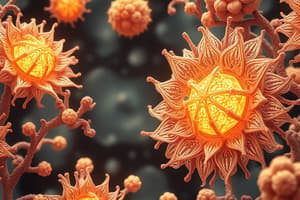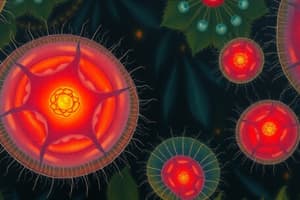Podcast
Questions and Answers
What type of cells are all protists?
What type of cells are all protists?
Eukaryotic
What does being eukaryotic mean?
What does being eukaryotic mean?
Having a nucleus and organelles
What type of cellular organization can protists have?
What type of cellular organization can protists have?
- Both A and B (correct)
- Multicellular
- Unicellular
- Neither A nor B
What are the three subcategories of protists?
What are the three subcategories of protists?
What are animal-like protists called?
What are animal-like protists called?
How do animal-like protists resemble animals?
How do animal-like protists resemble animals?
What are the finger-like structures used for movement in certain protists?
What are the finger-like structures used for movement in certain protists?
What are Pseudopods used for?
What are Pseudopods used for?
Give an example of a protist that uses pseudopods.
Give an example of a protist that uses pseudopods.
What is an example of a protist that has cilia?
What is an example of a protist that has cilia?
How do flagella help flagellates?
How do flagella help flagellates?
What type of protists are considered parasites?
What type of protists are considered parasites?
Give an example of a sporozoan.
Give an example of a sporozoan.
What characteristic is common to all protists?
What characteristic is common to all protists?
What are unicellular protists that produce oxygen called?
What are unicellular protists that produce oxygen called?
What type of algae are most brown, red, and green?
What type of algae are most brown, red, and green?
What kind of photosynthetic pigments are used to classify algae?
What kind of photosynthetic pigments are used to classify algae?
The kingdom Protista is the most diverse of all the kingdoms.
The kingdom Protista is the most diverse of all the kingdoms.
Protists can be grouped into 3 basic types: animal, virus, and plant-like.
Protists can be grouped into 3 basic types: animal, virus, and plant-like.
All protists are unicellular, eukaryotic, and have a nucleus with membrane-bound organelles.
All protists are unicellular, eukaryotic, and have a nucleus with membrane-bound organelles.
The __________ protists are all unicellular heterotrophs known as protozoans.
The __________ protists are all unicellular heterotrophs known as protozoans.
Amoebas move and change their body shape by making extensions of their body called _________.
Amoebas move and change their body shape by making extensions of their body called _________.
Amoebas use _________ to pump out excess water.
Amoebas use _________ to pump out excess water.
Most amoebas reproduce _________ where they divide into two identical cells.
Most amoebas reproduce _________ where they divide into two identical cells.
One group of protozoans ________ move by waving their flagella back and forth.
One group of protozoans ________ move by waving their flagella back and forth.
Paramecium move by wiggling their thousands of hair-like __________.
Paramecium move by wiggling their thousands of hair-like __________.
Parasitic protozoans called _________ live inside hosts and can produce spores that make us sick.
Parasitic protozoans called _________ live inside hosts and can produce spores that make us sick.
Malaria is caused by a protozoan called _______.
Malaria is caused by a protozoan called _______.
The insect that is responsible for transmitting malaria-causing protozoans to humans is ________.
The insect that is responsible for transmitting malaria-causing protozoans to humans is ________.
What are two common characteristics of all protists?
What are two common characteristics of all protists?
What type of protists are plant-like?
What type of protists are plant-like?
What type of protists are animal-like?
What type of protists are animal-like?
What type of protists are fungus-like?
What type of protists are fungus-like?
What is another name for plant-like protists?
What is another name for plant-like protists?
Why are protists so important?
Why are protists so important?
What gives algae their different colors?
What gives algae their different colors?
Why do algae need different accessory pigments and chlorophyll?
Why do algae need different accessory pigments and chlorophyll?
What is special about diatoms?
What is special about diatoms?
What are pseudopodia used for?
What are pseudopodia used for?
How are cilia and flagella useful to protozoans?
How are cilia and flagella useful to protozoans?
How do sporozoans reproduce?
How do sporozoans reproduce?
What are the characteristics of fungus-like protists?
What are the characteristics of fungus-like protists?
Which types of fungus-like protists are destructive to plants?
Which types of fungus-like protists are destructive to plants?
What are the characteristics of a slime mold?
What are the characteristics of a slime mold?
What type of organisms break down organic substances into materials used by other organisms?
What type of organisms break down organic substances into materials used by other organisms?
What is the cell wall composition of plant-like protists?
What is the cell wall composition of plant-like protists?
Flashcards are hidden until you start studying
Study Notes
Protists Overview
- All protists are eukaryotic, meaning they possess a nucleus and organelles.
- Protists can exist as unicellular or multicellular organisms.
- The kingdom Protista features three main subcategories: plant-like, fungus-like, and animal-like.
Animal-like Protists (Protozoans)
- Animal-like protists, known as protozoans, are heterotrophic and can move.
- They utilize structures called pseudopods for movement and food acquisition.
- Examples include the Amoeba, which uses pseudopods to change shape, and Paramecium, which moves using cilia.
- Flagellates are a subgroup of protozoans that move using whip-like flagella.
- Sporozoans are parasites that reproduce through spores and live inside host organisms; an example is Plasmodium, which causes malaria.
Plant-like Protists (Algae)
- Plant-like protists, referred to as algae, are autotrophic and major oxygen producers.
- Most brown, red, and green algae are multicellular.
- Algae classification is based on pigments, which allow them to absorb light at various depths.
- Accessory pigments and chlorophyll enable algae to capture light efficiently in different aquatic environments.
Fungus-like Protists
- Fungus-like protists are heterotrophic, reproducing through spores and exhibiting characteristics similar to fungi.
- Water molds play a critical role in breaking down organic materials, recycling nutrients in ecosystems.
- Slime molds are noted for their colorful appearance and can exhibit complex behavior.
Key Characteristics of Protists
- All protists are eukaryotic and thrive in moist environments, making them diverse in form and function.
- Protists can be classified based on their nutritional modes: autotrophic (plant-like), heterotrophic (animal-like), or spores-generating (fungus-like).
- The kingdom Protista is the most diverse of all biological kingdoms.
Importance of Protists
- They significantly contribute to oxygen production in the environment.
- Protists, particularly parasites like Plasmodium, can impact human health and ecosystems through diseases.
- They play essential roles in food webs and ecological functions.
Miscellaneous Information
- Diatoms are unique for their glass cell walls, which are composed of silica.
- Protozoans use pseudopodia primarily for food acquisition and mobility.
- Characteristics of slime molds include vibrant colors and complex life cycles.
- Spores are critical for reproduction in sporozoans and certain fungus-like protists.
Studying That Suits You
Use AI to generate personalized quizzes and flashcards to suit your learning preferences.




